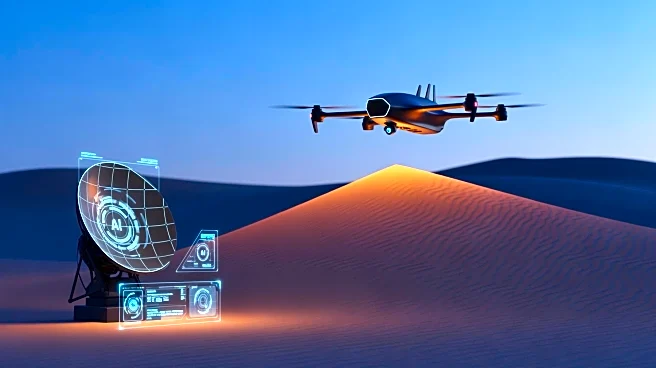What's Happening?
Emirati company Calidus showcased its Damita short-range air-defense system at the Dubai Airshow, held from November 15 to 19, 2025. The Damita system is described as the world's first AI-based integrated
counter-drone solution, utilizing multisensor fusion technology for real-time detection, classification, and interception of threats. The system includes a 35 mm self-propelled anti-aircraft gun mounted on Calidus's LIFV 8x8 armored vehicle, along with a remotely operated weapon station featuring 30 mm and 7.62 mm guns and an anti-tank guided missile. Additionally, the system employs laser and soft-kill effectors to counter unmanned aerial vehicles (UAVs). The Damita SPAAG displayed at the airshow was equipped with Rheinmetall's Skyranger 35 turret, capable of using Ahead programmable airburst ammunition. The laser system, a joint product of EOS and Calidus, can generate 50-150 kW, similar to the Apollo system unveiled by EOS at the DSEI show in London.
Why It's Important?
The unveiling of the Damita system represents a significant advancement in air defense technology, particularly in countering the growing threat of UAVs. As drones become increasingly prevalent in military operations, systems like Damita offer crucial capabilities for real-time threat detection and interception. The integration of AI and multisensor fusion technology enhances the system's effectiveness, potentially setting a new standard in air defense solutions. This development is likely to influence defense strategies and procurement decisions among military organizations worldwide, especially those within NATO, as indicated by the interest from an unnamed NATO country. The collaboration between Calidus and Rheinmetall also highlights the importance of international partnerships in advancing defense technologies.
What's Next?
Following the unveiling, Calidus may seek to expand its market presence by securing contracts with international defense organizations, particularly those interested in advanced counter-UAV capabilities. The system's AI-based technology could attract attention from countries looking to enhance their air defense systems against modern threats. Additionally, further collaborations with companies like Rheinmetall and EOS could lead to additional innovations and improvements in the Damita system. Stakeholders in the defense industry will likely monitor the system's performance and integration into existing military frameworks.
Beyond the Headlines
The introduction of AI-based defense systems raises important ethical and legal considerations, particularly regarding the use of autonomous technologies in military operations. The ability to detect and intercept threats in real-time without human intervention could lead to debates about accountability and decision-making in combat scenarios. Furthermore, the development of such systems may prompt discussions on international regulations and agreements concerning the use of AI in warfare, as countries seek to balance technological advancements with ethical standards.









